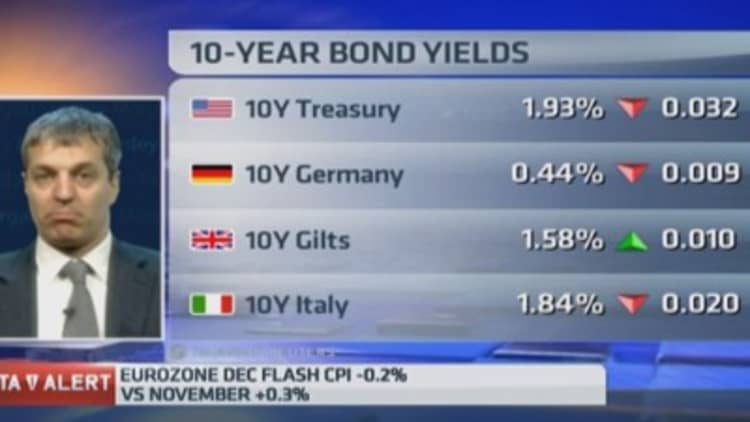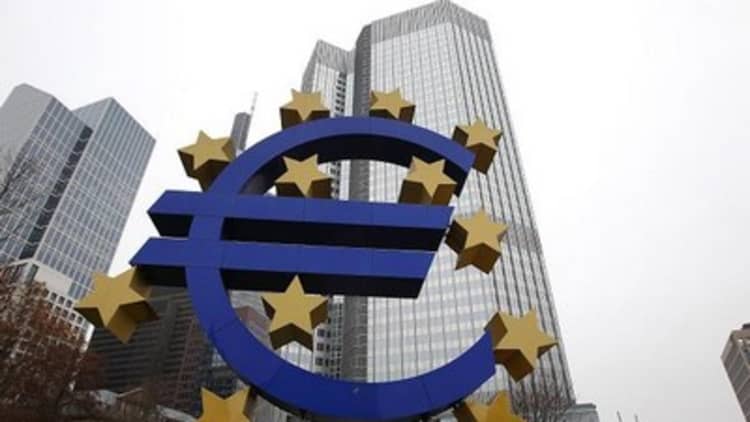
The long-feared threat of euro area deflation finally materialized at the end of 2014, data showed on Wednesday.
Consumer prices across the euro zone fell by 0.2 percent year-on-year in December, according to this first official estimate—worse than the 0.1 percent decline forecast, and down from November's 0.3 percent rise.
Read MoreEuro zone slips into deflation, pressure on ECB
Markets took the news on the chin however, with stock indexes in most euro zone countries, bar Greece, continuing to gain.
So does deflation in Europe's 19-country currency union really matter? CNBC takes a look at why central bankers, economists and politicians have reason to be worried.
'Credibility blow'
Maintaining price stability is the European Central Bank (ECB)'s raison d'etre, so the slip into deflation is a challenge to the bank's credibility.
"For a central bank whose sole mandate is to maintain price stability by meeting its inflation target of just below 2 percent, this is a severe blow to the credibility of Europe's monetary guardian," said Nicholas Spiro of Spiro Sovereign Strategy, in a research note on Wednesday.
The news will add to pressure on the ECB and its president, Mario Draghi, to announce a full-blown sovereign bond-purchasing program, known as quantitative easing (QE), at its meeting this month. The aim would be to boost money supply in the hope of promoting lending into the real economy.
"The ECB's hand has been forced. Anything less than a firm pledge by its president, Mario Draghi, that sovereign QE is imminent will be taken very badly by markets," wrote Spiro.

However, uncertainty about the form the QE program might take, and the likelihood of its success, continue to weigh.
Read MoreWhy European QE may not work
The ECB has already introduced a swathe of "unconventional" stimulus measures, including covered bonds and asset-backed securities (ABS)-purchasing programs, which have failed to see off deflation.
German opposition to QE is seen high and there are concerns the ECB might opt for watered-down version as a result, which could limit its stimulus potential.
For instance, the central bank could opt to only purchase the highest-rated sovereign bonds, in order to limit the risk taken on to its balance sheet.
Debt crisis No. 2?
After Wednesday's data, Capital Economics warned that the euro zone could now face a period of deflation lasting several months, which could imperil countries' efforts to reduce large debt piles. The value of debt is usually fixed in nominal terms, so falling price levels increase the real value of debt.
"It's too late to save the euro-zone from a period of deflation—and possibly a long and damaging one," said Jonathan Loynes, chief European economist at Capital Economics, in a note.
"With large amounts of slack in the economics, the unemployment rate still very high and inflation expectations already falling, there is a clear danger of a more sustained period of deflation which would destroy peripheral countries' debt consolidation efforts and could cause market concerns to once again to spread from Greece."
The debt burdens of several euro zone countries remain worryingly high. Although the European Commission is yet to publish national debt-to-gross domestic product (GDP) ratios for last year, it is known that Italy, Portugal, Greece and Ireland all had debt-to-GDP of well-over 100 percent in 2013.
Falling income danger
Deflation could also set off a downward spiral in demand, as consumers hold back on purchases, waiting for prices to fall still further, and companies cut back on investment for fear that future returns will be lower.
Thus far, this particular risk has been avoided, according to strategists led by Marc Chandler at BBH. In a note out Wednesday, he highlighted that Spanish retail sales had continued improving despite the country's descent in outright deflation, which preceded the broader euro zone one.
Read MoreMarkets are too pessimistic about growth: Analyst
On the other hand, deflation can provide a positive economic spur, with falling consumer prices boosting household spending. The risk though is that rather than simply boosting spending powers, falling consumer prices lead to declines in nominal household, business and government incomes. This in turn would increase the burden of servicing public and private debts.

